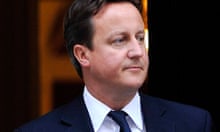David Cameron meets fellow European leaders today amid increasingly dire warnings that economic disaster is imminent unless the European Union can work out how to avoid an implosion of its currency, the credit rating of some of its members and its banks. As veteran Luxembourg politician Jean-Claude Juncker, head of the eurozone finance ministers, has said of the debacle, displaying impressive respect for understatement: "It does not appear a bright example of superior statesmanship."
Against this backdrop, the timing of tomorrow's debate calling for a referendum on Britain's membership of the EU appears misjudged. Called by Conservative Eurosceptic backbenchers, it asks for a set of three proposals to be put to the electorate in a referendum to be held within two years. These are: to withdraw from the EU completely; retain the status quo; or negotiate to repatriate a number of powers.
Ed Miliband, the Labour leader, has described the debate as "an irresponsible distraction". He has also criticised Cameron's decision to attend the Commonwealth summit in Perth on Wednesday as an abdication of responsibility at a "hugely dangerous moment for the world". Instead, he says, the prime minister should be "banging on the door to maintain British influence" in discussions on the Greek bailout, the recapitalisation of European banks and the construction of a new European economic architecture.
This seems sensible advice. The demand for a referendum, triggered by a petition of 100,000 on the Downing Street website, has attracted cross-party support including Labour MPs Kate Hoey and Kelvin Hopkins. However, the measure intended to foster democracy will result in all three party leaders imposing a three-line whip on their respective MPs – a move hardly likely to ease the public's mistrust of Parliament.
As it is, more than 60 Conservative MPs may defy David Cameron. The net result will mean that Cameron wins the battle but loses the war. The European wound that has damaged the Conservative party for decades has reopened; the stitches are once more unpicked. That is why tomorrow's debate, while ill-timed, is nevertheless much more than the "squabble" that Miliband has described. From tomorrow, it will be increasingly difficult to conceal the major fissures within the Tory ranks while an added strain will be placed on the coalition. In addition, our relationship with the EU will play a prominent part in a 2015 general election – at least if the majority of the Conservative parliamentary party now said to be Eurosceptic has its way.
Tomorrow, Cameron will be saved from his own party by Labour. He will gain the votes he needs. A referendum for now will be avoided. However, the debate is more than a challenge to Cameron's power. It will be seen, retrospectively, as the starting gun for a contest of utmost importance to the future shape of Britain. Over the next three years, as the dominant Conservative vision of what the UK's relationship should be with the EU becomes ever clearer, as Cameron "sharpens his pencil" on renegotiation, it is vital that both Nick Clegg and Ed Miliband articulate much more forcefully the positive aspects of the EU, the benefits it has brought its 27 member countries and a population of 500 million and the much-needed changes they would advocate to help the phoenix of a New Europe to arise out of the ashes of the present economic conflagration.
In 2002, the free marketer Milton Friedman predicted that "euroland" would collapse in five to 15 years. Eurosceptics such as William Cash, John Redwood and William Hague, and others, including the former prime minister, Gordon Brown, once dismissed as "Little Englanders", have been largely vindicated in their opposition to Britain joining the euro. It now transpires that for 17 member states of the EU, monetary union without greater fiscal and political union is a Rubik's Cube with no solution.
In other areas, the Eurosceptic argument has evolved as the EU has morphed from Margaret Thatcher's vision of a common market in goods and services to a union with its own foreign service, police, parliament and flag. Among the current Eurosceptic arguments is that EU red tape is stunting Osborne's quest for growth; it is undermining the UK's sovereignty, for instance, by imposing suffocating regulation on businesses and individuals alike, and its bloated bureaucracy prevents the UK from establishing free trade with emerging markets such as Brazil and India. It is a narrative that, at present, is easily winning the propaganda battle. A YouGov poll says 47% of the public would vote to renegotiate membership of the EU; 28% would vote to leave the EU and only 15% would vote to stay in the EU on current terms.
Changes are required but the counter-arguments need a much stronger platform and charismatic leadership of the style once given by "big beasts" such as Michael Heseltine. And it is the collective austerity advocated by the EU's centre-right leaders that is contributing to the flat-lining economy (not to mention heaping misery on ordinary families), not EU red tape.
While the Euroceptics have been right on the euro, they are wrong on the kind of relationship that they wish to see flourish between Britain and the EU. Waste, nepotism and fiddled expenses are rife in the EU; a lack of fiscal rectitude is what gained Greece membership in the first place. However, these transgressions can be addressed. What the public also deserves to hear is how EU membership has established family and employment rights and has championed equality. It allows for members to deal with major cross-border issues such as migration and criminality and trade more effectively (40% of Britain's trade is with the EU; the EU also trades well with India, Brazil and China). It is a prime example of "soft power"; it has brought peace and stability.
The Eurosceptics do not speak with a single voice. But one section certainly would turn Britain into a low-tax, deregulated, offshore haven for the very wealthy but with next to no protection for ordinary people. So, while there should be in due course a referendum to satisfy a clear demand for a renewed democratic mandate for our relationship with Europe, it must be preceded by a fully informed debate that includes considering the consequences of a wholesale renegotiation or departure.
Winston Churchill said of Europe: "We are interested and associated but not absorbed." It is the quality of that association that matters. We undervalue it at our peril.






